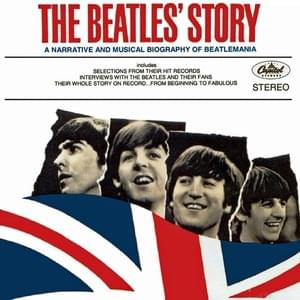
Beatlemania In Action The Beatles
На этой странице вы найдете полный текст песни "Beatlemania In Action" от The Beatles. Lyrxo предлагает вам самый полный и точный текст этой композиции без лишних отвлекающих факторов. Узнайте все куплеты и припев, чтобы лучше понять любимую песню и насладиться ею в полной мере. Идеально для фанатов и всех, кто ценит качественную музыку.

Interviewer: Well, what did it, uh, what did it do to you? You seem to be in a—
Girl 1: They were just like four boys. They're really likable, they were good, they were four great guys. It didn't really hit me. And then I see them standing there singing, and I don't know what they do—they just change you. They're not what they used to be. They're just so much better. (crying)
Girl 2: And [?] (crying) then you see them on stage, then thеy—then they—(crying)
Girl 1: Like it's, likе it's, they're just like a myth for you. It's what they seem like, every little movement is for you and no one else. It seems so personal, but yet it's just for everybody
Interviewer: Did you ever—Did you ever expect the concert to do this to you?
Girl 1: Oh, no, I came here to say, 'I'm not gonna scream. I'm not gonna cry. I'm not gonna do anything!' So here I am crying. And the thing is, I touched Paul the other day, and I thought, well that's not gonna be nothing, I've touched Paul McCartney. But now I've touched him, I can't touch him again, ever again, never. I got his autograph
Interviewer: Do you have anything else you want to add?
Girl 2: I—I just think that they're all the most wonderful person I've ever met in my whole life. I just love 'em
Narrator: Beatlemania. But what is Beatlemania? Mania by definition means craze. We've found a label but we still don't know what's inside the bottle. In Hamburg, Germany, where the early Beatles started, youngsters who didn't even understand English felt Beatlemania. Beatlemania is, in fact, a temporary state of mind, which can only be accurately described by the one who's under its influence. There are many reasons for Beatlemania...
Girl 1: They were just like four boys. They're really likable, they were good, they were four great guys. It didn't really hit me. And then I see them standing there singing, and I don't know what they do—they just change you. They're not what they used to be. They're just so much better. (crying)
Girl 2: And [?] (crying) then you see them on stage, then thеy—then they—(crying)
Girl 1: Like it's, likе it's, they're just like a myth for you. It's what they seem like, every little movement is for you and no one else. It seems so personal, but yet it's just for everybody
Interviewer: Did you ever—Did you ever expect the concert to do this to you?
Girl 1: Oh, no, I came here to say, 'I'm not gonna scream. I'm not gonna cry. I'm not gonna do anything!' So here I am crying. And the thing is, I touched Paul the other day, and I thought, well that's not gonna be nothing, I've touched Paul McCartney. But now I've touched him, I can't touch him again, ever again, never. I got his autograph
Interviewer: Do you have anything else you want to add?
Girl 2: I—I just think that they're all the most wonderful person I've ever met in my whole life. I just love 'em
Narrator: Beatlemania. But what is Beatlemania? Mania by definition means craze. We've found a label but we still don't know what's inside the bottle. In Hamburg, Germany, where the early Beatles started, youngsters who didn't even understand English felt Beatlemania. Beatlemania is, in fact, a temporary state of mind, which can only be accurately described by the one who's under its influence. There are many reasons for Beatlemania...
Комментарии (0)
Минимальная длина комментария — 50 символов.












